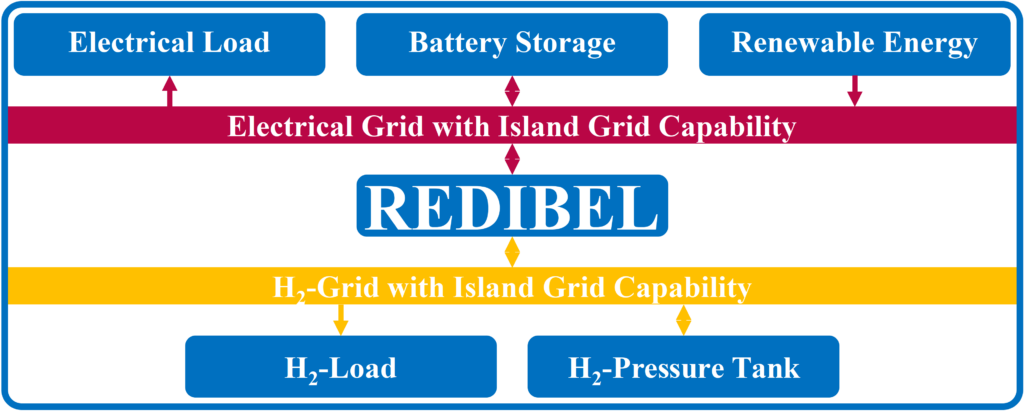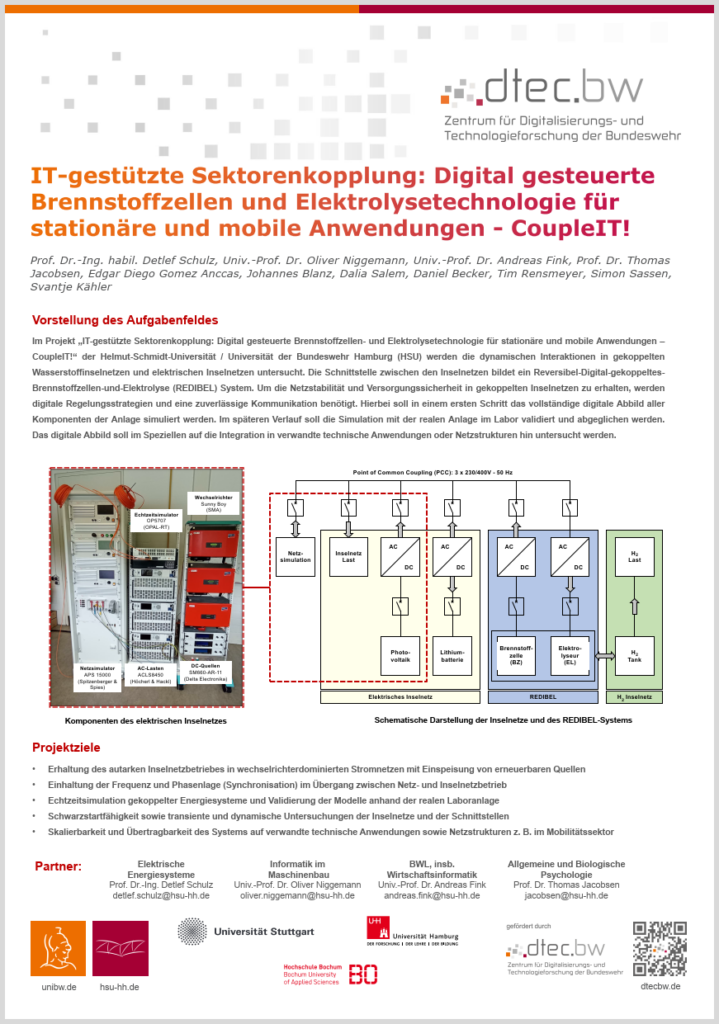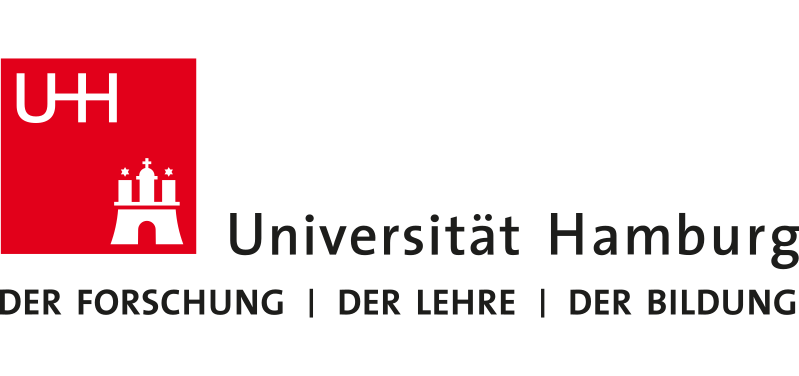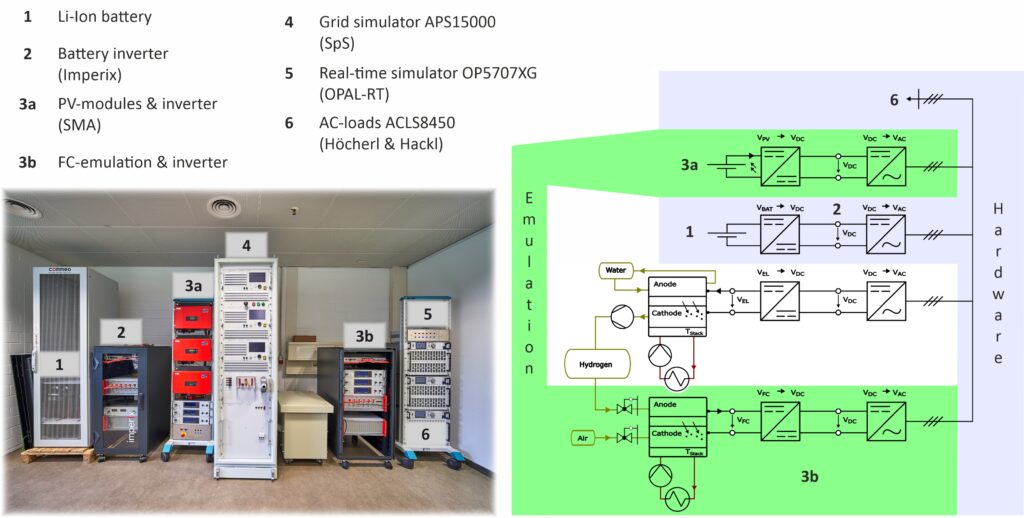IT-based sector coupling: Digitally controlled fuel cell and electrolyser technologies for stationary and mobile applications
News
16/07/2024
8th Project meeting, staged as hybrid event
At our 8th project meeting we were happy to receive in person our cooperation partners from the HSU-research groups of Prof. Jacobsen, Prof. Niggemann, and Prof. Fink. In addition, researchers from the groups of Prof. Schweizer-Ries (Bochum University of Applied Sciences) and Prof. Fischer (Universität Hamburg) attended in person. Finally, Dr. Atanasov (University of Stuttgart) took place online.
We are grateful to all participants for their contributions and the interesting exchange. More information can be gathered by following this link: 8th project meeting.
14/05/2024 –
15/05/2024
8th International Hybrid Power Plants & Systems Workshop, Azores, Portugal
At the 8th International Hybrid Power Plants & Systems Workshop in the Azores, an international audience enjoyed the presentation of our then most recent research. Diego Gomez held a talk that showed our newest findings that elicited interest by many researchers in our investigations.
21/12/2022
7th Project meeting, this time around live at the HSU-Campus
Having experienced only online meetings in the past due to the Corona situation we were delighted to be able to greet our project partners personally this time around.
On this occasion we asked our partners come to Hamburg and were happy to receive our HSU-affiliated partners from the groups of Thomas Jacobsen, Oliver Niggemann, and Andreas Fink as well as our external partners from the groups of Vladimir Atanasov (University of Stuttgart) and Petra Schweizer-Ries (Bochum University of Applied Science).
We thank all the participants for their contributions and the interesting exchange.
02/11/2022 –
04/11/2022
Oral presentation at the PESS & PELSS 2022 in Kassel, Germany
Our team member Diego Gomez presented the current state of his research at the Power and Energy Student Summit (PESS) und Power Electronics Student Summit (PELSS) in Kassel, Germany.
_______________________________________________________
Find out more about less recent events here: Archive
_______________________________________
Duration and Cooperation Partners
Duration
January 1st 2021 – December 31st 2024
Scientific cooperation
- Prof. Niggemann
Computer Science in Mechanical Engineering
– HSU –
- Prof. Fink
Economics and Social Sciences
– HSU –
- Prof. Jacobsen
General and Biological Psychology
– HSU –
- Prof. Fischer
Computer Networks
– Universität Hamburg –
- Dr. Atanasov
Chemical Engineering
– University of Stuttgart –
- Prof. Schweizer-Ries
Electrical Engineering and Computer Science for Sustainable Development
– Bochum University of Applied Sciences –
Industry cooperation
Project Description
____________
Abstract
The efficient and lossless storage of electrical power is indispensable for a comprehensive integration of sources of renewable electrical energy into the existing grid infrastructure. Following the Power-to-Gas approach a storage method meeting the aforementioned demands can be achieved by utilisation of an electrolyzer that converts electrical energy into chemical energy in the form of hydrogen. The loop is closed when a fuel cell reconverts chemical into electrical energy, following the Gas-to-Power path.
The advantage of hydrogen as an energy carrier is not only its ability to be reconverted into electrical energy but ,moreover, to be used both directly as a source for heat and as a precursor for the chemical industry.
For the loop Power-to-Gas ↔ Gas-to-Power to work seamlessly, a sophisticated coupling of the electrical and the gas grid is required so as to allow both grids to communicate with and react upon one another. The overarching goal is the sufficient provision of heat and electricity in a timely fashion.
The project CoupleIT! is dedicated to meet that goal.
____________
The project IT-based sector coupling: Digitally controlled fuel cell and electrolyser technologies for stationary and mobile applications — CoupleIT! Is divided into two sub-projects, SP1 and SP2, that are being worked on in parallel and planned to be intertwined in the course of the overall project.
In SP1 SmInT-Grid (Smart-InTegrated Grid) the dynamic interactions between coupled hydrogen and electricity grids are being investigated. The interface between the two grids is formed by a Reversible-Digitally-coupled-Fuel Cell-and-Electrolyser System (REDIBEL for the German “Reversibel-Digital-gekoppeltes-Brennstoffzellen-und-Elektrolyse”). In order to maintain grid stability and guaranteed supply in coupled grids digital control strategies and reliable communications are imperative. In a first step a complete digital copy of all components is to be simulated. Next, this so-called Digital Twin will be validated by being checked against its real-world counterpart in the laboratory. Having been validated successfully, the Digital Twin’s suitability to be integrated into related technical applications or grid structures will be explored. A schematic overview of the grid topology is presented in Figure 1.

A key aspect in SP1 are the dynamics in fuel cells and electrolysers. The efficiency of the coupling of the island grids will be the higher the faster all connected components react and adapt their state of operation. Compared to the electrical grid the hydrogen grid is by far the partner exhibiting higher inertia.
For this reason, CoupleIT! also aims at a minimisation of the differing speeds inherent to each grid for adapting their states. This challenge is being tackled in sup-project 2, SP2.
SP2 InDis-Zelle (German “Intern Digital ansteuerbare Brennstoff- und Elektrolyse-Zelle“, English “Internally Digitally controllable Fuel- and Electrolyser Cell“) is geared towards basic research into digitally controllable fuel cells (FC) und electrolysers (EL) by virtue of electrically controllable membranes. The goal is to improve dynamic and transient properties of FC and EL devices in order to then be able to match the time regimes that the electrical and the hydrogen grid operate in. In analogy to SP1, a Digital Twin is also being developed in SP2 that shall allow us to transfer principles of function from stationary to mobile applications. In addition, the Digital Twin makes it possible to simulate extreme conditions of operation so as to detect and transgress the limits of operation without suffering real harm.
The final stages of the project CoupleIT! will witness the combination of the two sub-projects on both the virtual layer, i. e. the integration of both Digital Twins into one another, and the real-world layer by translating the insights gained in SP2 into practical improvements in the laboratory set-up leading to an optimised coupling of the electrical and hydrogen grid.
Laboratory Set-Up and Mock-Ups
Depiction of the structure of electrical and hydrogen island grid as well as the laboratory set-up covering the electrical island grid.
Synergies and Connections
One important aspect of the dtec-programme is the fostering of synergies and interconnections between different research programmes, also such that themselves are not part of the dtec initiative. As such, our dtec-project CoupleIT! is not a solitary player but instead interconnected to the research programmes
- StBZuEL (Technical Development and Testing of electrically controllable Membrane Units in Proton-Exchange-Membrane Fuel Cells) und
- HyReflexS (Hydrogen-based Emergency Power Supply with Integrated Backup Power via Flexible Sector Coupling and Metal Hydride Storage).
Publications
Gomez Anccas, E. D.; Blanz, J.; Schulz, D.
Grid-forming fuel cell system for a multi-energy-microgrid in islanding operation
In: Power and Energy Student Summit (PESS) und Power Electronics Student Summit (PELSS), Kassel, Germany, 2nd – 4th November 2022
Helmut-Schmidt-Universität / University of the Federal Armed Forces Hamburg, Chair for Electrical Power Systems, Hamburg
University of Kassel; Hochschule Bonn-Rhein-Sieg; Fraunhofer IEE (Ed.)
VDE Verlag, Berlin 2023, vol. 1, p. 37, ISBN (print) 978-3-8007-6013-8, ISBN (ebook) 978-3-8007-6014-5
Bornholdt, H.; Röbert, K.; Breitbach, M.; Fischer, M.; Edinger, J.
Measuring the Edge: A Performance Evaluation of Edge Offloading
In: 2nd Workshop on Serverless computing for pervasive cloud-edge-device systems and services, co-located with IEEE Percom 2023
Universität Hamburg, Professur für Computer Networks
Eingereicht
Bornholdt, H.; Röbert, K.; Fischer, M.
Low-Latency TLS 1.3-aware Hole Punching
In: IEEE International Conference on Communications 2023
Universität Hamburg, Professur für Computer Networks
Eingereicht
Rensmeyer, T., Multaheb; S., Putzke; J., Zimmering, B.; Niggemann, O.
Using Domain-Knowledge to Improve Machine Learning – A Survey of Recent Advances
In: atp magazin
Helmut-Schmidt-Universität / University of the Federal Armed Forces Hamburg, Professur für Computer Science in Mechanical Engineering
vol. 63, pp. 78-84, DOI: 10.17560/atp.v63i9.2600
Sassen, S.; Fink, A.
Optimal Energy Scheduling for a Microgrid with Battery and Hydrogen Storage
In: NEIS 2022, Conference on Sustainable Energy Supply and Energy Storage Systems, Hamburg, Germany, 26th – 27th September 2022
Helmut-Schmidt-Universität / University of the Federal Armed Forces Hamburg, Chair for Economics and Social Sciences, Hamburg, Dezember 2022
VDE Verlag, Berlin 2022, vol. 4, pp. 139-144, ISSN 2510-6902, ISBN (print) 978-3-8007-5983-5, ISBN (eBook) 978-3-8007-5984-2
Gomez Anccas, E. D.; Blanz, J.; Schulz, D.
Islanded operation of an inverter dominated coupled multi-energy system
In: dtec.be-Beiträge der Helmut-Schmidt-Universität / Universität der Bundeswehr Hamburg: Forschungsaktivitäten im Zentrum für Digitalisierungs- und Technologieforschung der Bundeswehr dtec.bw
Helmut-Schmidt-Universität / University of the Federal Armed Forces Hamburg, Chair for Electrical Power Systems, Hamburg, Dezember 2022
vol. 1, pp. 20-24, ISBN (print) 978-3-86818-316-0, ISBN (online) 978-3-86818-315-3, DOI: 10.24405/14525
Gomez Anccas, E. D.; Becker D.; Schulz, D.
SmInT-Grid: Demonstrator eines multi-Energiesystems aus gekoppelten Inselnetzen
In: Hamburger Beiträge zum technischen Klimaschutz 2022: Analyse, Digitalisierung und Flexibilisierung von Energiemärkten, Elektromobilität, Sektorenkopplung, Elektroenergienetzen und Wasserstoffsystemen
Helmut-Schmidt-Universität / University of the Federal Armed Forces Hamburg, Chair for Electrical Power Systems, Hamburg, Dezember 2022
vol. 4, pp. 84-88, ISSN (print) 2698-8798, ISBN (print) 978-3-86818-252-1, ISSN (online) 2698-8801, ISBN (online) 978-3-86818-253-8, DOI: 10.24405/14594
Salem, D.; Schulz, D.
The Design of a Droop-based Grid Forming Inverter Controller for different Operation Modes and Conditions
In: Hamburger Beiträge zum technischen Klimaschutz 2022: Analyse, Digitalisierung und Flexibilisierung von Energiemärkten, Elektromobilität, Sektorenkopplung, Elektroenergienetzen und Wasserstoffsystemen
Helmut-Schmidt-Universität / University of the Federal Armed Forces Hamburg, Chair for Electrical Power Systems, Hamburg, Dezember 2022
vol. 4, pp. 89-97, ISSN (print) 2698-8798, ISBN (print) 978-3-86818-252-1, ISSN (online) 2698-8801, ISBN (online) 978-3-86818-253-8, DOI: 10.24405/14595
Sassen, S.; Fink, A.
Lastenglättung eines Microgrids mit zwei Speichersystemen und verschiebbaren Lasten
In: Hamburger Beiträge zum technischen Klimaschutz 2022: Analyse, Digitalisierung und Flexibilisierung von Energiemärkten, Elektromobilität, Sektorenkopplung, Elektroenergienetzen und Wasserstoffsystemen
Helmut-Schmidt-Universität / University of the Federal Armed Forces Hamburg, Chair for Economics and Social Sciences, Hamburg, Dezember 2022
vol. 4, pp. 98-103, ISSN (print) 2698-8798, ISBN (print) 978-3-86818-252-1, ISSN (online) 2698-8801, ISBN (online) 978-3-86818-253-8, DOI: 10.24405/14596
Gomez Anccas, E. D.; Blanz, J.; Vorwerk, D.; Schulz, D.
CoupleIT!: Smart Integrated Grid – Digitalisierte Kopplung des Strom- und Gasnetzes
In: Hamburger Beiträge zum technischen Klimaschutz 2021: Stand der Technik und Digitalisierung bei integrierten Energiesystemen, Sektorenkopplungs- und Mobilitätstechnologien
Helmut-Schmidt-Universität / University of the Federal Armed Forces Hamburg, Chair for Electrical Power Systems, Hamburg, Dezember 2021
vol. 3, pp. 57-63, ISSN (print) 2698-8798, ISBN (print) 978-3-86818-250-7, ISSN (online) 2698-8801, ISBN (online) 978-3-86818-251-4, DOI: 10.24405/13949
Poster for the Open Campus 2022

Cooperation Partners



Contact
Prof. Dr. Detlef Schulz (project leader)
[email protected]
+4940 6541-2757
Daniel Becker, PhD (group coordination)
[email protected]
+4940 6541-2245
Edgar Diego Gomez Anccas, M.Sc.
[email protected]
Dalia Ahmed Salem, M.Sc.
[email protected]
Jannes Seebeck, M.Sc.
[email protected]
Kazem Pourhossein, PhD
[email protected]
Taha Genco, PhD
[email protected]
Funded by

Letzte Änderung: 25. July 2024

